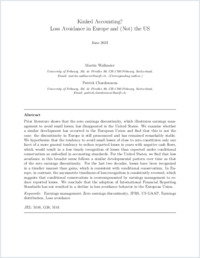Kinked Accounting? Loss Avoidance in Europe and (Not) the US
BP2-STS
- Wallmeier, Martin ORCID University of Fribourg
- Chardonnens, Patrick ORCID University of Fribourg
- 2021
English
Prior literature shows that the zero earnings discontinuity, which illustrates earnings management to avoid small losses, has disappeared in the United States. We examine whether a similar development has occurred in the European Union and find that this is not the case: the discontinuity in Europe is still pronounced and has remained remarkably stable. We hypothesize that the tendency to avoid small losses of close to zero constitutes only one facet of a more general tendency to reduce reported losses in years with negative cash flows, which would result in a less timely recognition of losses than expected under conditional conservatism as embodied in accounting standards. For the United States, we find that loss avoidance in this broader sense follows a similar developmental pattern over time as that of the zero earnings discontinuity. For the last two decades, losses have been recognized in a timelier manner than gains, which is consistent with conditional conservatism. In Europe, in contrast, the asymmetric timeliness of loss recognition is consistently reversed, which suggests that conditional conservatism is overcompensated by earnings management to reduce reported losses. We conclude that the adoption of International Financial Reporting Standards has not resulted in a decline in loss avoidance behavior in the European Union.
- Faculty
- Faculté des sciences économiques et sociales et du management
- Department
- Département des sciences du Management
- Language
-
- English
- Classification
- Economics
- Other electronic version
- License
-
License undefined
- Identifiers
- Persistent URL
- https://folia.unifr.ch/unifr/documents/320356
Statistics
Document views: 86
File downloads:
- 2021_Wallmeier_Kinked: 181
